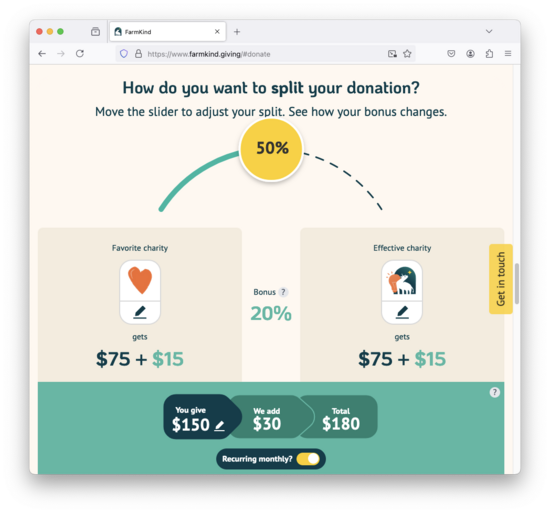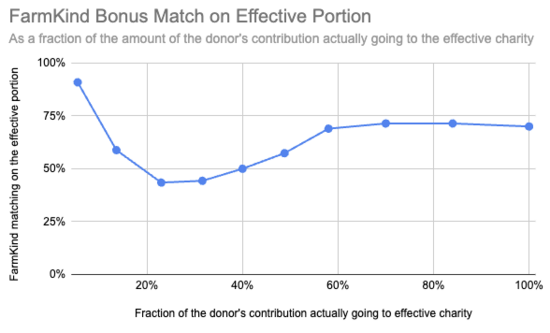FarmKind's Illusory Offer |
August 9th, 2024 |
| ea |
Personally, I would love to see a community-wide norm against EA organizations setting up donation matches. Yes, they bring in money, but at the cost of misleading donors about their impact and unwinding a lot of what we, as a community, are trying to build. [1] To the extent that we do have them, however, I think it's important that donors understand how the matching works. And not just in the sense of having the information available on a page somewhere: if most people going through your regular flow are not going to understand roughly what the effect of their choices are, you're misleading people.
Here's an example of how I don't think it should be done:
I come to you with an offer. I have a pot with $30 in it, which will go to my favorite charity unless we agree otherwise. If you're willing to donate $75 to your favorite charity and $75 to mine, then I'm willing to split my $30 pot between the two charities.
How should you think about this offer? As presented, your options are:
Do nothing, and $30 goes from the pot to my favorite charity.
-
Take my offer, and:
- $75 goes from your bank account to your favorite charity
- $75 goes from your bank account to my favorite charity
- $15 leaves the pot for your favorite charity
- $15 leaves the pot for my favorite charity
While this looks nice and symmetrical, satisfying some heuristics for fairness, I think it's clearer to (a) factor out the portion that happens regardless and (b) look at the net flows of money. Then if you take the offer:
- $150 leaves your bank account
- $90 goes to your favorite charity
- $60 goes to my favorite charity
If I presented this offer and encouraged you to take it because of my "match", that would be misleading. While at a technical level I may be transferring some of my pot to your favorite charity, it's only happening after I'm assured that a larger amount will go to mine: you're not actually influencing how I spend my pot in any real sense.
Which is why I'm quite disappointed that Charity Entrepreneurship decided to host a project that, after considering these arguments, decided to build FarmKind:
This is an animal-specific giving platform, largely inspired by GivingMultiplier. [2] It's not exactly the same offer, in part because it has a more complex function for determining the size of the match, [3] but it continues to encourage people to give by presenting the illusion that the donor is influencing the matcher to help fund the donor's favorite charity.
While setting up complex systems can cause people to donate more than they would otherwise, we should not be optimizing for short-term donations at the expense of donor agency.
Before starting this post I left most of these points as comments
on the EA
Forum announcement. I also shared a
draft of this post with FarmKind and GivingMultiplier for review
late Wednesday morning:
I've drafted a blog post that is critical of your work,
and I wanted to share it with you before publishing it so that you're
not
surprised by it: Farmkind's
Illusory Offer. I'm planning to publish this on Friday (August
7th [JK: this should have said 9th!]) morning, but if you'd like more
time to prepare a response let me know and I can delay until Wednesday
(August 14th).
While GivingMultiplier responsed with a few small requested edits,
FarmKind didn't respond. At the time I thought this was because they
had decided to stop
engaging with me but actually it was because the email ended up in
their spam folder. After publishing FarmKind let me know about this
and pointed out a few places where I had misunderstood them. I
appreciate the corrections and have edited the post.
[1] I think participating in existing donation match systems is
generally fine, and often a good idea. I've used employer donation
matching and donated via Facebook's Giving Tuesday match, and at a
previous employer fundraised for GiveWell's top charities through
their matching system. In the latter case, in my fundraising I
explicitly said that the match was illusory, that I and the other
sponsors would be donating regardless of what others did, and that
people should read this as an invitation to join us in supporting an
important effort.
[2] In 2021 I raised similar issues with GivingMultiplier, prompting them to add a transparency page. I appreciate GivingMultiplier's public explanation, and that FarmKind is also pretty public about how their system works.
[3] GivingMultiplier's algorithm for determining the bonus amount was "50% of the amount donated to effective charity". Here it's usually higher and occasionally lower (sheet):
Comment via: facebook, lesswrong, the EA Forum, mastodon, substack

